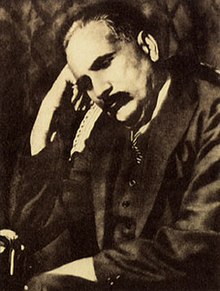Author:Muhammad Iqbal
Works[edit]
- The Reconstruction of Religious Thought in Islam The Reconstruction of Religious Thought in Islam—Copyrighted in the United States until 2025
- The Secrets of the Self, 1920
- Islam as an Ethical and Political Ideal, Iqbal's first English lecture given in Lahore, April 1908.
- Political Thought in Islam, This was the first paper of Iqbal to be published after the completion of his doctoral thesis. It was reproduced in "Hindustan Review", Allahabad (India), December 1910, pp. 527-33 and January 1911, pp. 22-26. Reprinted in 1989 by Bazm-i-Iqbal. Translated into Urdu as Khilafat-i-Islamia.
- Presidential Address to All-India Muslim League, Presidential Address to the 25th Session of the All-India Muslim League, Allahabad, 29 December 1930. Iqbal presented at this annual meeting the concept of a federation of the Muslim Majority Provinces.
- "Women in the East", This is the report of a correspondent of the Liverpool Post about his interview with Iqbal while he was in England during Round Table Conference.
- Iqbal's Interview with The Bombay Chronicle, On the eve of Iqbal’s departure for London to attend the second Round Table Conference (17th September – December 31, 1931), he gave an interview to a representative of the The Bombay Chronicle which is reproduced below.
- Presidential Address to All-India Muslim Conference, Presidential address delivered at the annual session of the All-India Muslim Conference, Lahore, 21 March 1932.
- Pan-Islamism, Statement explaning Fazl-i-Husain's observation in the council of state regarding Pan-Islamism issued on 19th September 1933.
- Islam and Ahmadism, Published in "Islam" of Lahore in January 1936.
- Islam and Nationalism, Statement on Islam and nationalism in reply to a statement of Maulana Hussain Ahmad Madani, published in "Ehsan" on the 9th March, 1938.
![]()
Some or all works by this author are in the public domain in the United States because they were published before January 1, 1929.
This author died in 1938, so works by this author are in the public domain in countries and areas where the copyright term is the author's life plus 85 years or less. These works may be in the public domain in countries and areas with longer native copyright terms that apply the rule of the shorter term to foreign works.
![]()
Public domainPublic domainfalsefalse
![]()
Some or all works by this author are in the public domain in India because they originate from India and their terms of copyright have expired. According to The Indian Copyright Act, 1957, all documents enter the public domain after 60 years counted from the beginning of the following calendar year after the death of the author (i.e. as of 2024, prior to January 1, 1964). Film, sound recordings, government works, anonymous works, and works first published over 60 years after the death of the author are protected for 60 years after publication.
Works by authors who died before 1941 entered the public domain after 50 years (before 1991) and copyright has not been restored.
Some or all works by this author are also in the public domain in the United States because they were first published outside the United States (and not published in the U.S. within 30 days), and they were first published before 1989 without complying with U.S. copyright formalities (renewal and/or copyright notice) and they were in the public domain in India on the URAA date (January 1, 1996). This is the combined effect of India having joined the Berne Convention in 1928, and of 17 USC 104A with its critical date of January 1, 1996.
The critical date for copyright in the United States under the URAA is January 1, 1941.
The author died in 1938.
This author died in 1938, so works by this author are in the public domain in countries and areas where the copyright term is the author's life plus 85 years or less. These works may be in the public domain in countries and areas with longer native copyright terms that apply the rule of the shorter term to foreign works.
![]()
Public domainPublic domainfalsefalse
